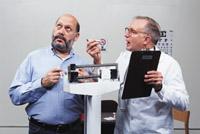Checks (II): the value of prevention

Doing a check-up is the best way to know the general state of our body and often also how to prevent it or detect it in the initial phases.
Keeping the body healthy and healthy is not that easy. As with any machine, and we must not forget that our interior is nothing more than a complex mechanism in which numerous assemblies, joints and chain reactions are concentrated, the use and passage of time gradually deteriorate our body. However, we have a point in our favor and that at some point in our life we can prevent or detect in time many of the evils that we can suffer.
And how can you get it? Through conventional checks or checks, among others. Often, these reviews or medical examinations allow us to know and identify conditions or diseases that only produce small discomfort or discomfort, seemingly insignificant, that in some cases are in a state of bankruptcy until the "opportune moment" arrives, which, so to speak, is never adequate, endangering our general state of health.
Everything as far as possible
In recent years it has been a very discussed issue the convenience of these periodic controls (subject already discussed in Elhuyar in numbers 60 and 61-62). Leaving aside sterile polemics, it is true that this type of studies and reviews provide us with almost all tranquility, since, if there is no unexpected reaction, we are told that our body is healthy. However, there are people who do not want to know anything, but in my opinion, and also from a purely medical point of view, it is convenient to face problems if there are. Passive attitude makes things seem more complicated than they really are. That's why the checks are beneficial, but of course, as far as possible, without becoming an "inveterate Cheozist".
There are people who by themselves are quite nervous, or hypochondriac, who hardly endure without the tranquility that these tests give them. Nor does it suit. I think that from the age of 45-50 it would be advisable to start with this type of checks, to start every two or three years, or if at any age they have already sought some alteration, be it of any type. If there is no suspicion, a full medical check-up can be enough every five years.
Prevention and diagnosis

XX. Since its introduction in the first decade of the 20th century and until today, checkups have become almost mandatory routines in most companies, which has had its advantages and drawbacks as always.
On the one hand, the extension of this type of studies caused tuberculosis to disappear practically in our country in the 1960s and 1970s. But like everything routinely done, these checkups have often become a kind of routine, which has made them lessen their effectiveness, which cannot be denied.
What do you want to do with checking? Complete (and, if applicable, rapid) study of the patient to rule out the existence of diseases and, if applicable, make a diagnosis quickly. The checkup consists of conducting a basic study and a series of scans as usual, even if the person does not have or explain anything suspicious.
Checks can be of two types, depending on the reason for their realization: preventive or diagnostic.
- Preventive check-up is the one done to a person who has no apparent symptoms and who claims to be well.
- The diagnostic check is performed by the patient when he says he has any discomfort. In these cases, it is normal for us to look for something that is directly wrong before we carry out general control.





